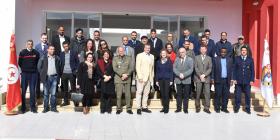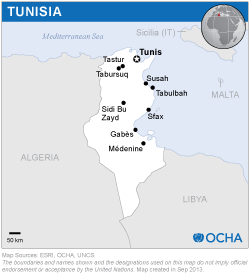- Alexandru Badea, Romanian Space Agency (ROSA)
- Kamel Tichouiti, Algerian Space Agency (ASAL)
- Alexia Tsouni, National Observatory of Athens (NOA)
- Francoise Villette, Expert on Earth observation and disaster management, and on Copernicus EMS
- Luc St-Pierre, United Nations Office for Outer Space Affairs (UNOOSA)
- Coen Bussink, UN-SPIDER (Head of Delegation)
- Radu Botez, UN-SPIDER
Three-day mission with a stakeholder workshop that brought together 21 participants from 13 Tunisian institutions, in addition to the mission team.
During the mission, the team was able to observe the common use of GIS by the consulted institutions, including ONPC, for the visualization of statistics on risks and occurrences of disasters. In addition, some institutions already regularly use satellite images, for example to analyze burnt areas after forest fires, while universities provide advanced training in geomatics. With regard to disaster risk reduction, space data and technologies are included in a draft DRR strategy, which is currently in the process of being adopted. By becoming an authorized user of the International Charter “Space and Major Disasters” and by benefiting from maps floods in the area of Nabeul in 2018 created by the Copernicus Emergency Management Service (Copernicus EMS), Tunisia is mobilizing relevant international networks and mechanisms to access information products based on satellite data during disasters.
The recommendations made by the team aim to further encourage the institutionalization of the use and sharing of satellite data and images through disaster risk management in Tunisia. The recommendations are described in more detail in the corresponding sections of this report and are in short:
Policy and coordination
- Strengthen the legal framework and collaboration for geospatial information
- Finalize the project for the creation of a national infrastructure for geographic information (INIG)
Access, availability and sharing of data
- Create an archive of available satellite images and accelerate their exploitation for disaster management purposes
- To deepen risk analysis in the territory by expanding and integrating the data repository and the tools used to publish the data more effectively
- Prepare information for rapid response disaster mapping
- Strengthen disaster risk reduction through mapping exercises
Capacity-building and institutional strengthening
- Ensure the presence of adequate human resources
- Use local and international geomatics training resources for capacity building
Strengthening early warning
- Establish a legal framework for early warning
- Ensure coordinated and cooperative early warning
- Strengthen emergency response
- Make field data collection more efficient and accurate
- Use international mechanisms and regional partnerships to obtain relevant maps and satellite imagery during disasters
| Attachment | Taille |
|---|---|
| Tunisia TAM - Data sources booklet | 969.11 KB |


